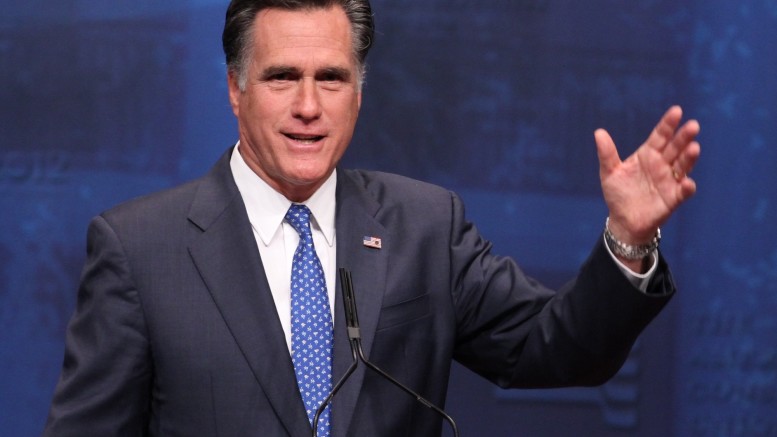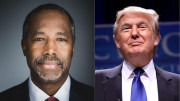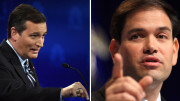The anti-Trump movement gains another spokesman later Thursday as Mitt Romney’s planned speech at the University of Utah promises to include a harsh assessment of Donald Trump.
Calling him a “phony” and a “fraud,” the former Republican presidential nominee laid into Donald Trump’s credentials as a presidential candidate for the party.
“His promises are as worthless as a degree from Trump University,” Romney said in speech excerpts released before his speech.
This is the latest salvo against the GOP frontrunner since the previous debate a week ago, when Florida Sen. Marco Rubio and Texas Sen. Ted Cruz ramped up the rhetoric prior to the Super Tuesday slate of primaries. After Trump’s victory in seven of the 11 states - though by a smaller margin than first realized - the angst among party leadership over a probable Trump nomination has forced many to come out against the New York billionaire.
“Here’s what I know: Donald Trump is a phony, a fraud,” Romney said in his talk. This is not the first time the former Massachusetts governor has attacked Trump, most recently he went after the candidate’s hesitation to denounce white-supremacist David Duke and the KKK. But it will be the most pointed attack he has made against the man some in the Republican Party believe will become the nominee.
To help party activists feel more comfortable speaking out against the real estate mogul, Romney admitted what many Republicans feared: a Trump nomination would likely mean a Hillary Clinton presidency. Further, the former party leader said that his presumed successor “has neither the temperament nor the judgment to be president.”
Based on the delegate math laid out for the party, Trump is dancing on the line of having enough delegates to capture the nomination prior to the July convention. According to the Associated Press, Trump is gathering about 46 percent of the delegates he needs to win the nomination and needs to ramp it up to around 51 percent to succeed. That is not entirely impossible, however, as there are some winner-take-all states coming up, including March 15th when Ohio and Florida are up for grabs. That is where Ohio Gov. John Kasich and Rubio hope to stem the tide against Trump by winning their home states.
However, FiveThirtyEight’s Aaron Bycoffe said that Trump is just barely on target with the nominees necessary to win the race.
“Looking forward, Trump should win more delegates in states with fewer college-educated voters. If Trump hits his targets in the remaining contests, he’ll end up with 1,276 delegates out of 2,472 — 52 percent,” Bycoffe said. He did caution that there is little room for error in the race going forward and that losses in Ohio and Florida, or even underperforming in states that dole out delegates proportionally, will keep Trump from winning the nomination.
Another problem for Trump that arrived Wednesday was the realization that his Super Tuesday victory was closer than initially appeared. Because each of the states hand out delegates based on the percentage of votes received both statewide and in each congressional district, the total number of delegates received for each candidate was different than initially thought. And while Trump nabbed the most delegates with 249, Cruz came in a close second at 214, with 20 delegates left to be determined.
That means Trump only won 41 percent of the delegates Tuesday night, just slightly higher than the 34 percent of the total vote he has received in all of the primaries combined.
It means little to the frontrunner, though, as he has turned his eyes to the general election while continuing to attack his opponents. Prior to Romney’s speech, Trump set off a series of angry tweets at the former nominee, blasting Romney for his loss in 2012 and seeking the real estate mogul’s endorsement at the time, too. During an interview on NBC earlier in the day, Trump claimed that Romney was a failed politician.
“Mitt Romney is a stiff,” he said on the “Today” program. “Mitt Romney will not get elected. Mitt Romney failed twice and really failed last time. He was going against a president that should have been beaten.”
Despite Trump’s thoughts that Romney is launching a third-party campaign, aides close to the former GOP nominee insist that was not the case. Neither was an endorsement forthcoming.
While this speech aims to be the most aggressive attack against Trump from Romney, it is uncertain if there will be any change in the momentum seemingly attached to the populist’s campaign. Previous attempts to thwart the billionaire has caused little change in the polls, though voters who have decided in the last few days prior to the primary election have overwhelmingly rejected Trump. And that small statistic may be what is keeping anti-Trump leaders hopeful, even against the tide.
“Why can’t the leaders of the Republican Party see that I am bringing in new voters by the millions — we are creating a larger, stronger party!” Trump said on Twitter.
It is true that turnout in the primaries have largely been higher for the Republican Party, it is still early to determine if the voters were first-timer angry at the GOP establishment or traditionally independent and Democratic voters passionate solely about Trump’s rhetoric.
With March 15 looming, and many party insiders worried it will be the last chance to prevent a Trump nomination without succumbing to underhanded tactics in the convention, all eyes have turned to Thursday’s debate and Romney’s speech for signs of hope. The comments by Ben Carson that were just short of ending his campaign, but instead skipping the debate and saying there is no political path for him to win, means that the four remaining candidates will be at each others’ throats to build the momentum.
Romney’s speech may set the tone for Cruz, Rubio and Kasich, as he lays out specific problems with a Trump presidency.
“His domestic policies would lead to recession. His foreign policies would make America and the world less safe. He has neither the temperament nor the judgment to be president. And his personal qualities would mean that America would cease to be a shining city on a hill,” Romney said.
To add to the notion that the party is on the verge of collapse in the face of a Trump nomination, the Associated Press asked GOP governors and senators if they would support the billionaire if he became the nominee. Of the 59 who responded, just less than half refused to commit to backing him. Some, such as Massachusetts Gov. Charlie Baker and Nebraska Sen. Ben Sasse have outwardly said they will not support Trump. Others, such as New Mexico Gov. Susanna Martinez, have said denounced the candidate’s campaign while avoiding to directly answer the question.
Latest posts by Staff (see all)
- Romney Rips Into Trump - March 3, 2016



